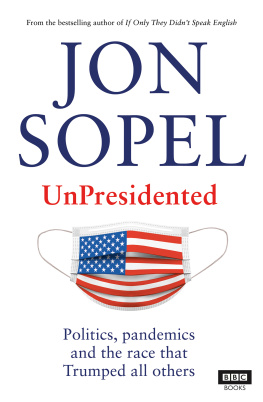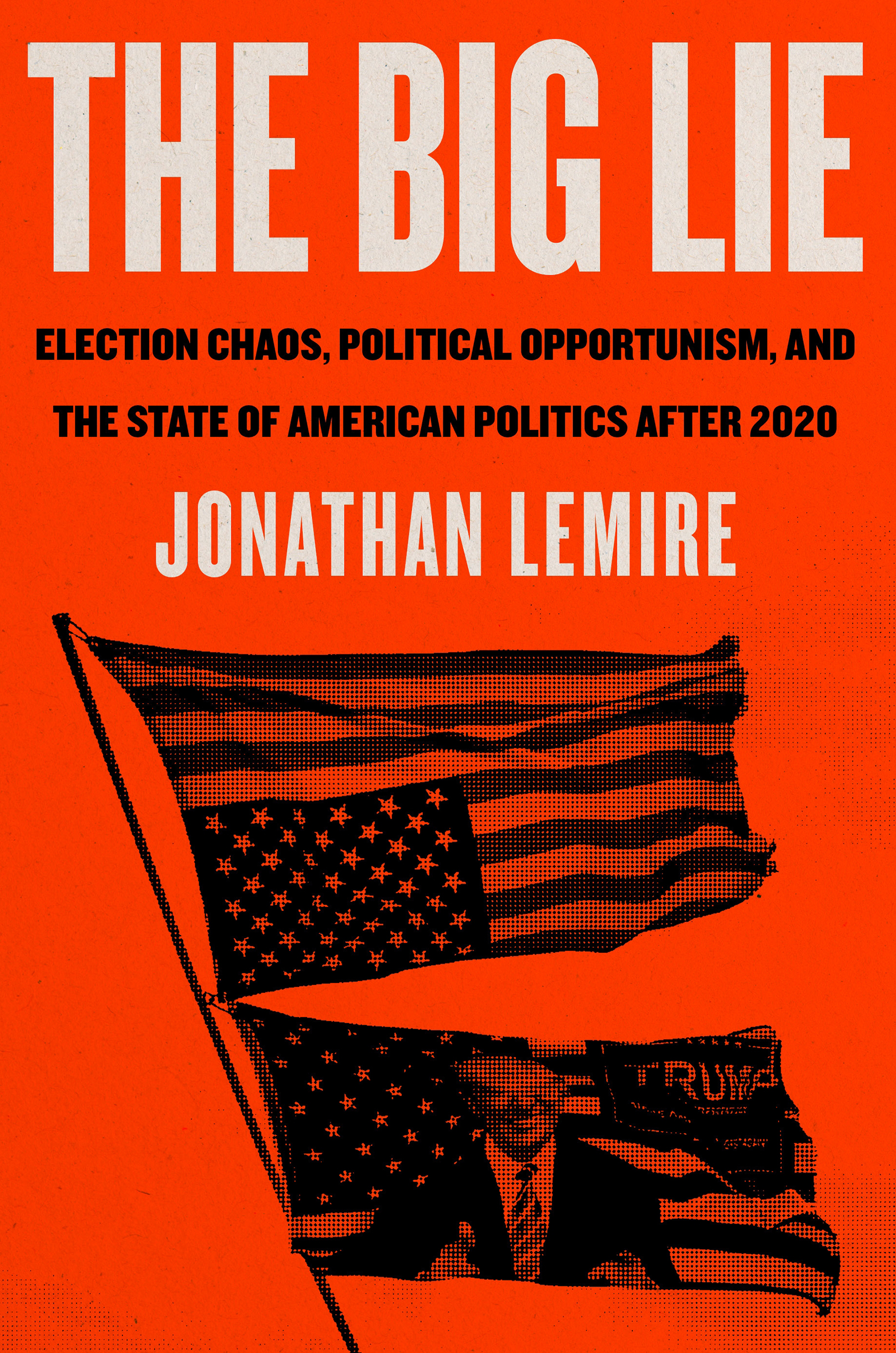Contents
Guide
Pagebreaks of the print version

The author and publisher have provided this e-book to you for your personal use only. You may not make this e-book publicly available in any way. Copyright infringement is against the law. If you believe the copy of this e-book you are reading infringes on the authors copyright, please notify the publisher at: us.macmillanusa.com/piracy.
For Carrie, Beckett, and Flynn
In retrospect, it was an unlikely place to begin historys greatest assault on American democracy.
The Greater Columbus Convention Center sits where Interstate 670 and Route 23 intersect, just north of the Ohio capital citys downtown. There are acres of parking, the usual nondescript convention centerstyle hotels, and outposts of the standard chain restaurants. Famously, Ohio States football stadium sits three miles to the north; less famously, the home of the National Hockey Leagues Blue Jackets is just a few blocks to the south.
Though not nearly as well known as Ohios other big cities that all happen to start with the same letterCleveland to the north, Cincinnati to the southColumbus is actually by far the largest, home to over nine hundred thousand people, a top-twenty city in the nation. And any metropolis, particularly one home to a massive university, state government offices, and a burgeoning e-commerce industry, needs a big convention center.
This one fits the bill, clocking in at 1.8 million square feet. Each year it hosts a pleasant slate of wildly diverse events, with highlights including what is dubbed the largest annual horticulture trade show in America; a three-day anime convention dubbed Ohayocon, whose name is a mix of the words Ohio and ohayou (Japanese for good morning); and, of course, the Arnold Sports Festival, which was founded by bodybuilder/actor/governor Arnold Schwarzenegger and draws more than two hundred thousand attendees every March.
But on August 1, 2016, the Greater Columbus Convention Center served as the birthplace of the Big Lie.
Little about the setting or the timing suggested that history was about to forever tilt off its axis.
A few thousand people, a decent crowd but not one that packed the space, had filed into one of the convention center wings, which had been partitioned to create a modest-sized room amid a cavernous hall. It was early in the day and the energy was very much onand not offthe charts. Those in attendance fit the profile of a typical midwestern crowd, many middle-aged or older, perhaps whiter than most gatherings. Many wore red hats.
It was a run-of-the-mill campaign rally, sure to be just like the ones in Colorado a few nights before and those scheduled for Pennsylvania later that day and in Virginia the next.
Instead, with one seemingly off-the-cuff remark uttered within the walls of the convention center that day, Donald Trump threatened the tradition of peacefully contested American elections and challenged the very essence of a fair democratic process.
Im afraid the election is going to be rigged, I have to be honest, Trump said.
It had begun. The seeds of the Big Lie had been planted. A celebrity candidate with little regard for the truth had publicly doubted the intrinsic fairness of Americas most sacred democratic institution, taking the first step on a journey that would undermine the integrity of the presidency, fuel a violent insurrection at the US Capitol, imperil voting rights ahead of the 2022 and 2024 elections, and forever change both political parties.
For the first time, Trump cast doubt on the results of the 2016 general election and, weeks later, he would become the first major presidential candidate to not promise to abide by those results. In times of war, in times of peace, in times of deep civil unrest, one of the few American constants was the firm conviction that an election would be held on its appointed date and that its results would be honored by the winners and losers alike, with a smooth and amicable transfer of power.
Not by Trump. He had never been one to go quietly, to accept defeat, to cede the stage. He had whined months earlier that the Iowa caucuses, which he lost narrowly, had been conducted unfairly. Hell, he once thought that the Emmysfor which his reality TV show The Apprentice and its spin-off, Celebrity Apprentice, were nominated a total of nine times but never wonwere fixed.
But this was different. In the months and years that followed, it was clear that the ripples in the water from the rock Trump had thrown that day in Ohio would turn into tidal waves, swamping political discourse and nearly drowning a democracy.
Everything had irrevocably changed, but no one knew how just yet. Reporters in the convention center quickly pinged their editors, realizing that what they had thought might be the days lead storyTrumps ongoing war of words with the family of a Muslim serviceman killed in Iraqwould no longer be what drove the headlines. But there was no way to immediately grasp the magnitude of what had just happened.
I was there that day. My lede for the Associated Press, which was on the wire and online within minutes and then printed the next day in newspapers throughout the country and mirrored on websites around the world, was simple and stark:
COLUMBUS, Ohio (AP)Republican presidential nominee Donald Trump suggested Monday that he fears the general election is going to be riggedan unprecedented assertion by a modern presidential candidate.
We had never been here before. And what would come over the next four and a half years would test every institution in American democracy, from the government to the courts to the free press. Trump had already been an unconventional candidate: vulgarly casting aside political norms; feuding with Republicans and Democrats alike; hugging flags and tweeting with abandon. He would generate headlines, stir controversy, and dominate the political and media landscape like no one before him. He was, and is, a singular figure.
His eventual presidency would strain alliances, upend traditions, and plunge Washington into chaosbefore, in a remarkable third act, being overwhelmed by a global pandemic. I covered all of it. And yet his mismanagement of the nations response to COVID-19, which saw more than four hundred thousand deaths under his watch, would somehow not be his defining moment.
Instead, what will be forever linked to Donald Trump is the mob that committed violence in his name on January 6, 2021. They were convinced by his Big Lie that the election had been stolen, that there had been widespread voter fraud, that their president was being unfairly deposed. None of that had happened. But Trump told them it had. And they believed him.
And they chose violence.
Holding Trump signs and using American flags as weapons, the rioters stormed the US Capitol, a building symbolic as a citadel of democracy, and in doing so stirred echoes of the angst and blood of the Civil War era. Only this time the violence was instigated by a duly elected president unwilling to honor the foundational principle of a peaceful transfer of power.
The scene that unfoldedthe mob pushing through police barricades, breaking windows, occupying seats of powerwas one that Americans are accustomed to watching from afar, unfolding in distant lands with authoritarian regimes. But this violence, which included gunshots fired in the Capitol, five deaths, and an armed occupation of the Senate floor, was born of the man who had sworn an oath to protect the very democratic traditions that rioters tried to undo in his name.




![T. H. Logwood - Voter Fraud and the 2020 Presidential Election; “Joe Biden wins by a Miraculous Landslide” [with appendices]](/uploads/posts/book/259666/thumbs/t-h-logwood-voter-fraud-and-the-2020.jpg)

